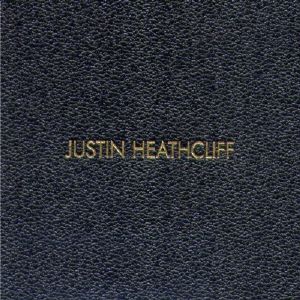
- Format: MP3

Justin Heathcliff
Well, this is a curiosity. "Justin Heathcliff" is a bit of a forgery, a faux British psych folk
album written, recorded and performed by one Osamu Kitajima, who went on to a long and
successful career peddling new age music to the masses (as well as picking up a PhD, apparently:
he's "Dr." now.) The story goes that Mr. Kitajima was writing commercial jingles when he decided
to move to the UK, where he was exposed to British folk and psych (there's no readily available
information about what, exactly, he discovered, but I'd guess that the Incredible String Band
and Syd Barrett are in there somewhere.) Whatever music might have inspired him, he chose a
suitably English sounding pseudonym and in 1971 unleashed Justin Heathcliff's one and only album
on an unsuspecting world (well, OK, just Japan.)
There are a lot of remarkable things about this lone effort, the most obvious of which is how
good the "forgery" is. Foreign languages are notoriously difficult to sing with credibility, and
Kitajima's delivery must have fooled more than a few people. He has a rich, throaty baritone and
phrasing that spins his slight Japanese accent into a vocal mannerism, sounding a bit like a
deeper version of Badfinger's Pete Ham or, more recently, Super Furry Animals' Gruff Rhys (in
fact, fans of early SFA would be well advised to give this a spin.) There's also the music
itself, which takes in seemingly every studio trick available to a post-Sgt. Pepper artist and
whips it up into a gentle psych coctail that might have been a few years out of date by the
early 70s, but nonetheless has aged well enough that it could easily have been part of the indie
psych pop resurgence of the 90s (Apples In Stereo, Dexide The Emons, The Sights, etc.)
The second remarkable thing is how strong the material is. Kitijima left Japan as the folk boom
was really gaining steam, and he takes that burgeoning aesthetic and filters it through
kaledoscope eyes and a laundry list of instrumentation, taking what could have been another
pleasant but faceless folk album and cranking up the interest by several notches. There might
not be anything pioneering about the elements of this album in and of themselves, but take "Good
Bye:" the effortless shifts from simple to odd to Beatle-esque digression to whatever you'd call
that guitar solo are simultaneously thrilling and effortless. "You Know What I Mean" brings up
that Badfinger comparison again, but with more Kinks and very British whimsey in the mix.
Seriously, who taught this guy how to put this stuff together? A career of writing TV commercial
jingles can explain catchy songwriting, but doesn't explain where Kitijima got his mastery of
using the stereo effect with such dynamics. Which leads to the third remarkable thing: for a one
off album made by a guy who was essentially recording his debut, it doesn't just sound great, it
sounds modern. Post-modern to be exact, with a range of styles, approaches, and sonic trickery
that effects everything from the arrangements all the way down to the sonic space of the record
itself. If someone had told me it was a new album produced by some Pitchfork ready group of
nostalgia minded 20 year old American midwesterners, I'd have no cause to doubt them. There's
nothing about the album that wasn't already present (and, in many ways, had already come and
gone) by 1971 in the UK, but there's an intangible quality that would make it at home in the
present day, and not just as an influence. The only thing that sound like they could be dated
are some of the sentiments: "To Live In Peace" and "You Should All Think More" are about exactly
what you think they are, and closing the album with a seventeen second ditty called "Love Makes
The World Complete" is wide eyed, unironic hippiedom at its most obvious.
Thing is, even these (now) naive sounding sentiments find some currency when they're couched in
rich, warm psych pop that's as well constructed as "Justin Heathcliff." All the above talk about
sonic detail and post modernism should not be taken to mean the album lacks immediacy or simple
charms. It's an effortlessly entertaining work, and it's a shame Kitijima didn't see his way
clear to make more of the same: after this, he dropped the pseudonym and recorded what was
obstensibly his debut. While that album, "Benzaiten," shares the sonic richness of "Justin
Heathcliff," it was a much more experimental (and instrumental) work, adhering more closely to
the still new progressive music coming from the UK that he undoubtedly absorbed along with the
pop he emulated on this effort. Alone as it may be, "Justin Heathcliff" isn't just a curiosity,
it's a minor lost classic, an album that would doubtless find it's fanbase quickly should it see
a wide western release.
---